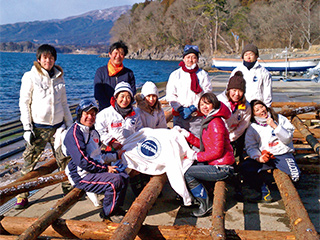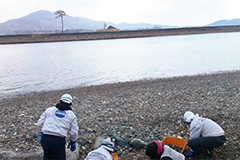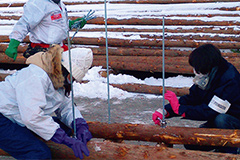Volunteer Activities Vol.3
ITOCHU Group employees engaged in volunteer work for supporting areas devastated by the Great East Japan Earthquake and tsunami from February 16 to 19. It was the third round of such support activities the ITOCHU Group had launched last December.
On this occasion again, a group of 10 ITOCHU employees worked hard at a support site in Rikuzen Takata City, Iwate Prefecture, during the daytime, undaunted by a low February temperature. They assisted reconstruction by eating and drinking at a restaurant in Kesennuma City, Miyagi Prefecture, at night. All participants in this third round of support activities were ITOCHU Group employees, but most of them met others in the volunteer group for the first time. The 10 volunteers became one team from the first day and kept working as hard as they could for three days.
ITOCHU will continue these support activities by volunteer employees.

Participation in Great East Japan Earthquake Volunteer Activities
This time out, the people we met in Rikuzentakata and Kesennuma expressed a similar sentiment. “Thanks to everyone's support, we have all the material goods we need. What we still lack is the ongoing presence of people on the ground. At first, there were a huge number of folks coming to help, but over time those numbers have dwindled. With the road to recovery still so far off, there's no telling how many years it will take if this trend continues.” The most essential thing needed now is people on the ground, the most basic thing that we all have to give.
At ITOCHU, we always think of ourselves as a group with the most vitality anywhere. If there ever was a time to put that strength to use for the good of society, that time is now! As peers and colleagues bound together by mutual trust, I have no doubt that the power we bring to any single project we take on far exceeds that of our numbers on paper. My recent volunteer work with the terrific members of my group has only confirmed this conviction. I definitely hope to volunteer again someday.
For the Sake of Ongoing Support of Recovery
The tasks we were assigned to for the three-day period were the building of platforms for oyster farming, and the separation and collection of debris. Neither of these tasks is possible without having people there on the ground. While debris can be collected using heavy machinery, because the many materials must be dealt with differently, the sorting of it has to be done by hand. The same is true for collecting debris from riverbeds, since heavy machinery cannot go in. This is the reason why it is critical to recruit more people to work on the ground—without help, none of this work can happen. Standing in front of the mountains of debris, there where times when I didn't know what to do and felt like the task before us was hopelessly large. But working together with the other members of my group we gradually made progress in the cleanup.
Individually, the power that each of us wields is truly small. But when those small bits of power come together, they transform into something phenomenal. The recovery and revitalization of the Tohoku region is impossible if the small power that we all possess fails to come together. The recovery today is still in its very earliest stages. I want to take this opportunity to let everyone out there know that the power you have as an individual is still very much needed.

Turning Small Power Into Something Much Larger
With nearly a year having now passed since the disaster, I'm beginning to ask myself again what, if anything, I can do to help. Until now, I thought that the support that I could offer was limited to donations. But that's where I was wrong. There continues to be a shortage of people to help at disaster sites. Man or woman, young or old, whatever your occupation, none of it matters when you're onsite. Put simply, what is needed most is the power of individual people. I'm talking about picking up a hammer or a shovel, something not many of us are used to, and working away at the task at hand until it hurts. This is something that anyone who has mobility can do to help.
There are many things that cannot be understood without witnessing them personally onsite. There you will find things that words simply cannot describe. I sincerely hope that more people will be reminded of those living in the disaster-stricken region by going there and experiencing the reality of life there for themselves. I am also praying for the swiftest possible recovery in the region.







